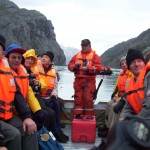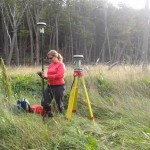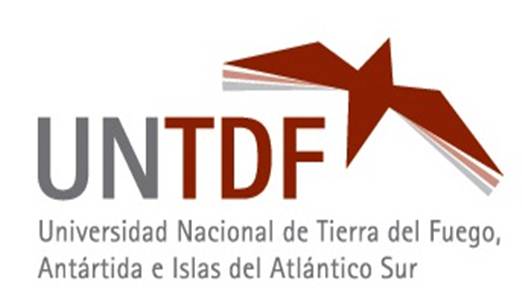 Increasingly science funding agencies around the world are recognizing the need to link academic research and private and public sectors. Chile’s national science and technology commission (CONICYT) recently created a program to encourage precisely that type of linkage. One of the selected projects was presented by Dr. Silvia Murcia and Ernesto Davis, previously the beneficiary of an OSARA scholarship to conduct his masters. Their proposal, entitled Scientific-Technological Transfer for the Training of the Tourism Sector in the Magallanes and Chilean Antarctic Region, includes the participation of COMAPA, one of the major tourism companies in southern Patagonia. Over the course of a year, this co-financing of CONICYT and COMAPA will allow a systematic training regime to be implemented for the company’s guides. However, a novel aspect of the program will be not merely to teach the guides scientifically-related topics, but also to train them to become monitors within the national parks they visit to collect important (and hard to access) data and also as a “real-time” feedback mechanism for the company itself to evaluate and improve its practices, such as environmental impact but also the development of new narratives and content for the offerings provided to tourists. OSARA’s role in the project will be to advise the development of monitoring criteria and protocols and training for guides in the area of sustainable development and conservation.
Increasingly science funding agencies around the world are recognizing the need to link academic research and private and public sectors. Chile’s national science and technology commission (CONICYT) recently created a program to encourage precisely that type of linkage. One of the selected projects was presented by Dr. Silvia Murcia and Ernesto Davis, previously the beneficiary of an OSARA scholarship to conduct his masters. Their proposal, entitled Scientific-Technological Transfer for the Training of the Tourism Sector in the Magallanes and Chilean Antarctic Region, includes the participation of COMAPA, one of the major tourism companies in southern Patagonia. Over the course of a year, this co-financing of CONICYT and COMAPA will allow a systematic training regime to be implemented for the company’s guides. However, a novel aspect of the program will be not merely to teach the guides scientifically-related topics, but also to train them to become monitors within the national parks they visit to collect important (and hard to access) data and also as a “real-time” feedback mechanism for the company itself to evaluate and improve its practices, such as environmental impact but also the development of new narratives and content for the offerings provided to tourists. OSARA’s role in the project will be to advise the development of monitoring criteria and protocols and training for guides in the area of sustainable development and conservation.
Monthly Archives: March 2013
Canadian Researchers Initiate Collaboration in TDF
 A group of five eco-hydrologists and riparian restoration specialists, led by Dr. Cherie Westbrook at the University of Saskathchewan, visited Tierra del Fuego from mid-February to mid-March to initiate a collaboration with the Austral Center for Scientific Research, the National University of Tierra del Fuego and the Argentine Administration of National Parks. Their team based their work in Tierra del Fuego National Park and started a long-term study of the effects of beavers on the hydrology and geomorphology of Tierra del Fuego’s watersheds. Ultimately, these results will be crucial to understand how and if riparian ecosystems can be restored upon beaver removal. An associated project, led by Dr. Colin Whitfield, studied the effects of beavers on carbon dynamics, specifically emission of methane. These results too will prove crucial in filling gaps in our current knowledge and understanding about the impacts of beaver invasion in southern Patagonia, particularly as they relate to carbon storage and sequestration.
A group of five eco-hydrologists and riparian restoration specialists, led by Dr. Cherie Westbrook at the University of Saskathchewan, visited Tierra del Fuego from mid-February to mid-March to initiate a collaboration with the Austral Center for Scientific Research, the National University of Tierra del Fuego and the Argentine Administration of National Parks. Their team based their work in Tierra del Fuego National Park and started a long-term study of the effects of beavers on the hydrology and geomorphology of Tierra del Fuego’s watersheds. Ultimately, these results will be crucial to understand how and if riparian ecosystems can be restored upon beaver removal. An associated project, led by Dr. Colin Whitfield, studied the effects of beavers on carbon dynamics, specifically emission of methane. These results too will prove crucial in filling gaps in our current knowledge and understanding about the impacts of beaver invasion in southern Patagonia, particularly as they relate to carbon storage and sequestration.
Tierra del Fuego Set to Conform Network with “Archipelagic” Universities
 As part of the Argentine Ministry of Education’s efforts to increase networking capacity of its universities, the National University of Tierra del Fuego (UNTDF) recently was awarded a project to lead the conformation of a network of “archipelagic” universities that include the University of the West Indies with various campuses throughout the Caribbean and the Universidad de La Laguna in Tenerife, Canary Islands, Spain. The proposal includes plans to work over the coming year to define the areas between these universities where collaborative projects can be developed in the areas of student exchange, territorial development, and environmental management/conservation with a specific emphasis on how each of these axes interface with the particular condition of being found in an archipelagic setting.
As part of the Argentine Ministry of Education’s efforts to increase networking capacity of its universities, the National University of Tierra del Fuego (UNTDF) recently was awarded a project to lead the conformation of a network of “archipelagic” universities that include the University of the West Indies with various campuses throughout the Caribbean and the Universidad de La Laguna in Tenerife, Canary Islands, Spain. The proposal includes plans to work over the coming year to define the areas between these universities where collaborative projects can be developed in the areas of student exchange, territorial development, and environmental management/conservation with a specific emphasis on how each of these axes interface with the particular condition of being found in an archipelagic setting.
